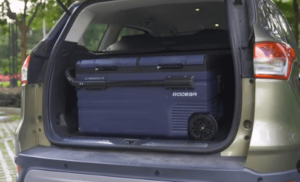Can you use an extension cord with a refrigerator? This question is one that many people ask themselves when considering whether to purchase a new appliance. Whether or not you can use an extension cord with your refrigerator depends on two factors: the type of plug that the instrument has and the power needs of the fridge. Here, we have provided some information below to help answer this question for you!
Type of Plug
If your appliance has a three-pronged grounded plug, you can use an extension cord with it. However, if it only has two slots for prongs on the end of the plug, you cannot use one. This is because appliances with this type of connector are not grounded and will be more likely to experience power surges if plugged into an ungrounded extension cord without proper grounding built-in.
What kind of refrigerator do I own?
The plugs should be easy enough to tell just by looking at the appliance itself; there shouldn’t need to be any guesswork involved! Once you know what type they’re using (either two or three prongs), go ahead and check out the next section for more information on what you can do.
Is it a two or three-prong plug?
If your appliance has a plug with only two slots to hold the wires, it cannot be plugged in using an extension cord. This is because devices with this type of connector are not grounded and will be more likely to experience power surges if they’re plugged into ungrounded extension cords without proper grounding built-in.
Do I need Grounding?
There’s one exception where you don’t necessarily need ground wiring: when there’s no metal housing around these types of plugs (such as double insulation). If the plug isn’t grounded but has no metal casing, it should still work with a grounded extension cord.
What can I use for an Extension Cord?
So, the question is, can you use an extension cord with a refrigerator? You can purchase two-wire cords with plugs that accept appliances, like hairdryers and electric razors. Plug these cables into the appliance’s power outlet and plug the other end into a wall receptacle or power strip with ground wiring built-in. Do not plug one of these extensions cords into another extension cord without grounding them first!
Suppose you don’t want to buy this type of cable. In that case, there are still some options out there: You may be able to get away with using any three-wire electrical device–make sure it has its ground contact because they’re more likely than double-insulated devices to experience surges when power is restored.
If you can’t find a three-wire device, or if the cord isn’t long enough for your space needs, try finding an ungrounded extension cord with at least one grounded receptacle on it (a green plug). Plugin the appliance’s power cable and run another extension cord from the other end of this newly created circuit to a wall outlet. You may want to take extra caution when doing so because there are increased risks involved–but not as many as using two cords without grounding them first!
Another option would be buying some adapters designed for use with refrigerators: assuming they work properly, these will have current limiting features built into their circuitry that should protect both the instrument and the receptacle it is plugged into from damage.
The third option–which should be the last resort!- would be to use an appliance power cord extender, which can connect two power cords with a device placed between them that limits the flow of electricity and reduces voltage surges. Make sure you read carefully about how these work before considering using one, as they can have some dangerous safety risks associated with improper or prolonged use. You can check out the video to know the safety tips of using extension cords.
Video: EBP Supply Solutions
What to Do? Can you use an extension cord with a refrigerator?
If your fridge doesn’t have ground attachment points on its plug (you’ll notice this because there won’t be any green coloring like other plugs), then make sure you’re using grounded extension cords when running wires through floors or walls that are not solidly grounded themselves; if doing so elsewhere, make sure that you are not using the cord in an area where it can contact any metal.
You should also consider grounding your fridge to the ground if possible. This will help with noise reduction and prevent electrical surges from affecting other appliances plugged into the same outlet. If doing so is not feasible for whatever reason, then at least try to run wire through pipes or conduits underground; do NOT put cords on top of dirt or sand because these materials have no conductive qualities whatsoever.





